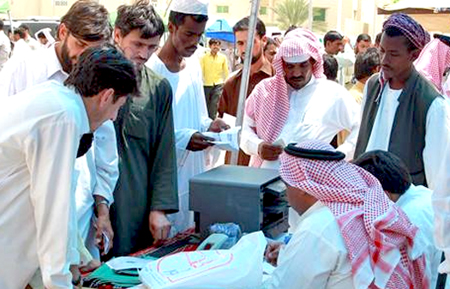 Jeddah, Jul 18: The salaries of expatriates in the private sector rose by 25 percent while those of Saudis declined by 1 percent during 2013, according to a report published by Al-Eqtisadiah business daily on Thursday, quoting figures released by the Labor Ministry and the Saudi Arabian Monetary Agency (SAMA).
Jeddah, Jul 18: The salaries of expatriates in the private sector rose by 25 percent while those of Saudis declined by 1 percent during 2013, according to a report published by Al-Eqtisadiah business daily on Thursday, quoting figures released by the Labor Ministry and the Saudi Arabian Monetary Agency (SAMA).
“The salaries of expats during the year rose by 25 percent or SR236 from an average salary of SR1,341 in 2012 to SR1,808 in 2013,” the report said. The average salary received by Saudis in the sector fell by one percent from SR4,801 in 2012 to SR4,748 in 2013.
Speaking with Arab News, Ibrahim Badawood, managing director of Abdul Latif Jameel Community Services, voiced his doubts about the accuracy of the salary hikes for expatriates. However, he said that if this was the case, it might be due to three reasons.
“First, it is very difficult to get visas to recruit foreign workers. Second, red-category firms have to increase salaries if they want to keep their foreign workers. Third, Saudis are not ready to do certain jobs and those expats doing these jobs may be asking for higher salaries,” he said.
Saudis receive more than double the salary received by expats in all job categories. For secretarial jobs their average salary is SR4,300 against SR1,640 for expats, sales jobs SR3,200 against SR1,200 for expats and assistant engineering jobs SR4,800 against SR1,000 for expats.
Expats contacted by Arab News expressed their astonishment over the huge salary divide between Saudis and expats, saying it’s unfair. “Salaries should be based on productivity rather than nationality,” said one expat.
According to the SAMA report, the average salary of employees in the private sector is SR2,962. However, the ministry’s statistics put it at SR2,134, a difference of SR828.
The report stated that the number of Saudis working in the private sector rose by 29 percent or 332,200 in 2013 with Saudi women taking 85 percent or 182,700 jobs, with Saudi men at 16 percent or 149,500.
The total number of Saudi women working in the sector rose from 215,800 to 398,500 in 2013 while that of Saudi men jumped from 918,800 to 1.1 million.






Comments
Add new comment